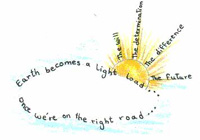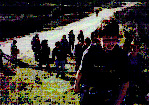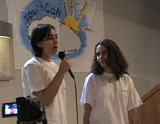Using ICT for Environmental Education and Youth Empowerment in Lebanon
05/05/03, Beirut

The Youth CaN Med (Youth Communicating and Networking – Mediterranean) project is introducing sustainable, systematic technology into Lebanese schools to enhance student’s understanding of environmental issues. This USAID/Lebanon dot-EDU project, awarded to the Education Development Center and implemented by iEARN (International Education and Resource Project), is setting the standard for youth empowerment projects through its focus on youth leadership and technical training of students and teachers. Youth CaN Med enables environmentally active youth to exchange ideas and encourage others to make a difference in their own communities. The project uses information communication technologies (ICTs) to support education that is activity-oriented and stimulates a desire to learn and act locally.

Houssam Hariri High School students on a mountain environmental hike
So far, Youth CaN Med has held a teacher training workshop and eight week course on the integration of an international online collaborative project in the classroom. Activities like environmental hikes, site visits to other schools and conferences enable students to interact directly with their peers and their environment; they use information and communication technologies (ICT) to capture what they’ve learned.
On May 5th, 2003, Youth CaN Med held its second annual youth conference organized by iEARN at the Children’s Science Museum in Beirut. Approximately four hundred students from schools across Lebanon and an Egyptian delegation made presentations on 27 projects and participated in discussions about environmental protection. The conference became truly international when participants held live discussions with YouthCaN New York and delegations from Morocco, India and Lebanon via videoconferencing technology. Topics included landmine awareness, pesticide use, recycling, wastewater treatment, deforestation and silkworm art. Students also shared information about their use of telecommunications and other technologies in local, national and global environmental projects.
The event was co-sponsored by the US Embassy in Beirut, USAID/Lebanon and dot-EDU, Hariri Foundation and the Youssef Kamel Cultural Center in cooperation with the Ministry of Education and the Ministry of Environment. “We were pleased to have a large audience in order to get the opportunity to share our hard work and our message about pesticides and their dangers…The conference that was held online with New York gave all participants the opportunity to talk about their project,” said three Grade 10 students of the Universal School of Lebanon.

Students presented and led discussions at the conference
These youth are much more than conference participants—they have become environmental leaders. In the months leading up to the conference, students held an environmental rally, prepared presentations and exchanged ideas with youth from other communities. They learned how to post content online, develop power point presentations and discuss environmental issues in class and in online discussion groups. These skills will enable them to continue working on environmental issues in their own communities.
For more information, please contact:
- EDC Bill Wright, Project Director wwright@edc.org
- iEARN Ed Gragert, Project Director ed1@us.iearn.org
- iEARN Eliane Metni, Project Coordinator
eliane@emetni.com
